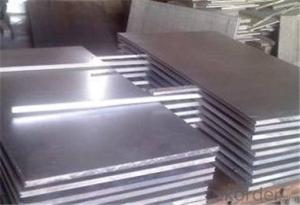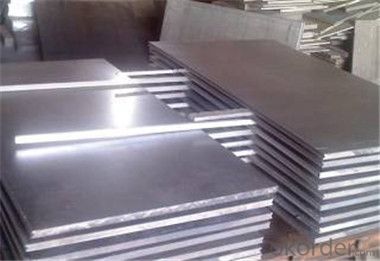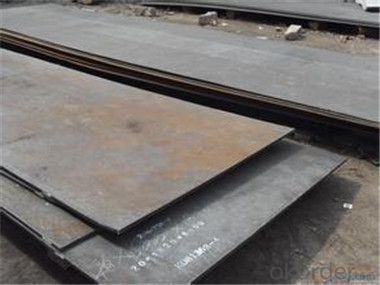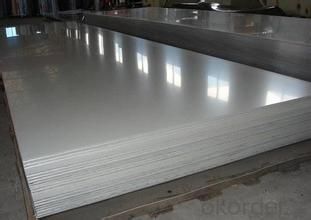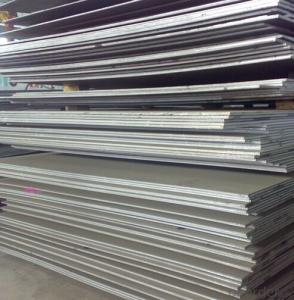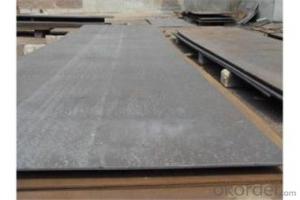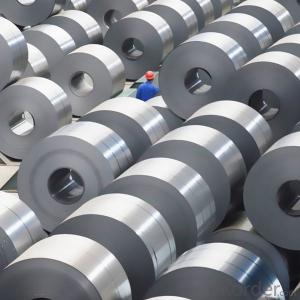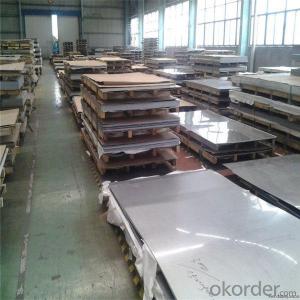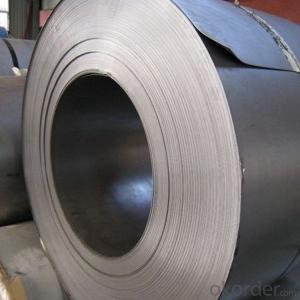Hot Rolled Steel Sheets A36 for Sale from China
- Loading Port:
- Tianjin
- Payment Terms:
- TT OR LC
- Min Order Qty:
- 50 m.t.
- Supply Capability:
- 1000065 m.t./month
OKorder Service Pledge
OKorder Financial Service
You Might Also Like
Specification
Description of steel sheets:
A36/A516 Gr.60/70 hot rolled oil tank/carbon boiler steel plate/sheet
1.Width:1500--4020mm
2.Length:3000-27000mm
Festures of steel sheets:
Steel plates are widly used as boiler plate, container plate, flange plate and ship plate,
and also widly used in building construction. The size of steel plate can be made according
to clients requirements.
Specifications of steel sheets:
Surface Finishes: Bare, Oiled, Mill Varnish, Galvanize, Tape Wrap.
Processing service: Transverse cutting, longitudinal cutting, trimming, volume classification, coated film, coated paper, profile of cutting, bending, punching, welding, removing rust, and product packing, shipping services and On-site assistance.
Images of steel sheets:
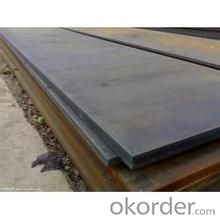
FAQ:
1. What is your package?
Packing situation: standard seaworthy packing or as customer required.
2. How long is the lead time?
Delivery time: 45 days after order confirmed.
3. What payment term do you accept?
Payment: T/T or L/C at sight.
- Q: Do the steel sheets have any sharp edges?
- Indeed, sharp edges can be found on steel sheets. Throughout their production, steel sheets frequently undergo cutting or shearing processes, thereby resulting in the presence of sharp edges. It is of utmost importance to exercise caution when dealing with steel sheets and to employ suitable protective gear, like gloves, while working with them, in order to prevent any harm arising from the sharp edges.
- Q: What is the average thickness of steel sheets?
- The average thickness of steel sheets can vary depending on various factors such as the specific type of steel, its intended application, and industry standards. However, in general, steel sheets can range in thickness from around 0.4 millimeters (0.016 inches) to several millimeters (0.1 inches or more). It is important to note that different industries and applications may have specific requirements for steel sheet thickness, so it is always best to consult relevant standards or specifications for accurate information.
- Q: 16 what is the hardness of manganese steel plates?
- Manganese steel is a kind of high strength abrasion resistant steel. It is mainly used to endure shock, extrusion, material wear and other bad working conditions. The form of failure is mainly wear and tear, partial fracture and deformation. The wear is divided into three types: the friction and wear between the contact surface of the metal component and movement; abrasive wear and erosion of flowing gas or liquid and metal contact wear caused by other metal or non-metal materials against the metal surface. The wear resistance of wear-resistant steel depends on the material itself, while the wear-resistant steel shows different wear resistance under different working conditions. Both the material itself and the working conditions can determine its wear resistance.
- Q: What are the bending and forming capabilities of steel sheets?
- Steel sheets have excellent bending and forming capabilities due to their high tensile strength and ductility. They can be easily bent into various shapes without losing their structural integrity, making them suitable for applications requiring complex designs and precise specifications. Additionally, steel sheets can be formed through processes such as rolling, stamping, and deep drawing, allowing for the production of a wide range of products with different shapes and sizes.
- Q: How do steel sheets handle extreme weather conditions?
- Steel sheets are known for their exceptional durability and resilience, making them highly suitable for handling extreme weather conditions. Their ability to withstand harsh environments and extreme temperatures sets them apart from other materials. One of the key factors that contributes to steel sheets' ability to handle extreme weather is their high strength. Steel sheets are manufactured using a combination of iron and carbon, which provides them with excellent structural integrity. This strength enables them to resist the impact of strong winds, heavy snow loads, and intense heat, making them ideal for use in areas prone to hurricanes, blizzards, or heatwaves. Additionally, steel sheets have a high resistance to corrosion and rust. This is achieved through the process of galvanization, where a protective layer of zinc is applied to the steel surface. This zinc layer acts as a shield, preventing moisture and oxygen from reaching the underlying steel and causing corrosion. As a result, steel sheets can withstand prolonged exposure to rain, humidity, and saltwater without deteriorating, which is especially important in coastal or humid regions. Moreover, steel sheets have excellent thermal efficiency, enabling them to handle extreme temperature variations. They can effectively insulate buildings during cold winters and keep them cool during scorching summers. This thermal efficiency helps to maintain a comfortable indoor environment, reduces energy consumption, and contributes to cost savings. Furthermore, steel sheets are fire-resistant, providing added safety in areas prone to wildfires or industrial accidents. They have a high melting point, which means they are less likely to deform or collapse under extreme heat. This fire resistance helps to protect structures and minimize the spread of fires, enhancing overall safety. In conclusion, steel sheets are well-equipped to handle extreme weather conditions due to their high strength, resistance to corrosion, thermal efficiency, and fire resistance. Their durability and resilience make them an ideal choice for various applications, including roofing, siding, and construction, ensuring the longevity and safety of structures in even the most challenging weather conditions.
- Q: How are steel sheets protected during storage in warehouse facilities?
- Steel sheets are protected during storage in warehouse facilities through various measures such as applying protective coatings, using moisture-resistant packaging, implementing proper stacking and handling techniques, and maintaining controlled temperature and humidity levels to prevent corrosion and damage.
- Q: Can steel sheets be used for wall cladding?
- Yes, steel sheets can be used for wall cladding. Steel is a durable and versatile material that can be shaped into thin sheets, making it suitable for cladding applications. It offers excellent strength, weather resistance, and can be finished with various coatings to enhance its aesthetic appeal.
- Q: Are steel sheets suitable for food storage applications?
- Food storage applications can benefit greatly from the use of steel sheets. This material offers exceptional durability and versatility, with its resistance to corrosion making it an ideal option for storing food. Steel sheets create a hygienic and secure environment for food, as they are non-porous and do not retain odors or flavors. Moreover, they provide reliable protection against contaminants and pests, ensuring the maintained quality and freshness of the stored food. Furthermore, steel sheets are effortlessly cleaned and maintained, making them the perfect choice for food storage facilities, restaurants, and any other setting where food safety is of utmost importance.
- Q: What are the different surface treatments for steel sheets?
- Steel sheets offer a range of surface treatments, each designed for specific purposes and offering unique advantages. Some commonly used treatments include: 1. Hot-dip galvanizing: Immersing the steel sheet in molten zinc forms a protective layer, providing excellent corrosion resistance. This treatment is ideal for outdoor applications like roofing, fencing, and automotive parts. 2. Electroplating: Using an electric current, a thin layer of metal such as chromium, nickel, or zinc is deposited onto the steel sheet. Electroplating enhances the appearance, corrosion resistance, and can improve wear resistance. 3. Powder coating: Dry powder is applied to the steel sheet and then baked to create a durable, smooth, and uniform finish. Powder coating offers excellent corrosion and impact resistance, and comes in various colors and textures, making it suitable for architectural, automotive, and appliance uses. 4. Painting: Applying paint to the steel sheet provides aesthetic appeal and protects against corrosion. Different types of paints, such as epoxy, polyurethane, or acrylic, can be used based on desired appearance and environmental conditions. 5. Passivation: This chemical treatment removes impurities and contaminants from stainless steel sheets, improving their corrosion resistance against oxidation and staining. 6. Electropolishing: By immersing the steel sheet in an electrolyte bath and applying an electric current, a thin layer of material is removed, resulting in a smoother, brighter surface that is more resistant to corrosion. These examples demonstrate the variety of surface treatments available for steel sheets. The most suitable treatment depends on factors like intended application, desired appearance, corrosion resistance requirements, and budget. Seeking advice from a steel sheet supplier or surface treatment specialist can help determine the optimal treatment for specific needs.
- Q: What is the recommended storage method for the steel sheets?
- To effectively store steel sheets, it is recommended to place them in a well-ventilated and dry location. It is crucial to keep the sheets away from both moisture and direct sunlight, as these factors may lead to rust and material degradation. By stacking the sheets on pallets or racks with adequate spacing between them, potential damage can be prevented. Furthermore, it is advisable to cover the sheets with a protective material like a tarp or plastic wrap to provide additional protection against dust and other contaminants. To maintain their longevity and usability, regular inspection and maintenance of the storage area, along with maintaining an inventory of the sheets, are highly recommended.
Send your message to us
Hot Rolled Steel Sheets A36 for Sale from China
- Loading Port:
- Tianjin
- Payment Terms:
- TT OR LC
- Min Order Qty:
- 50 m.t.
- Supply Capability:
- 1000065 m.t./month
OKorder Service Pledge
OKorder Financial Service
Similar products
Hot products
Hot Searches
Related keywords
